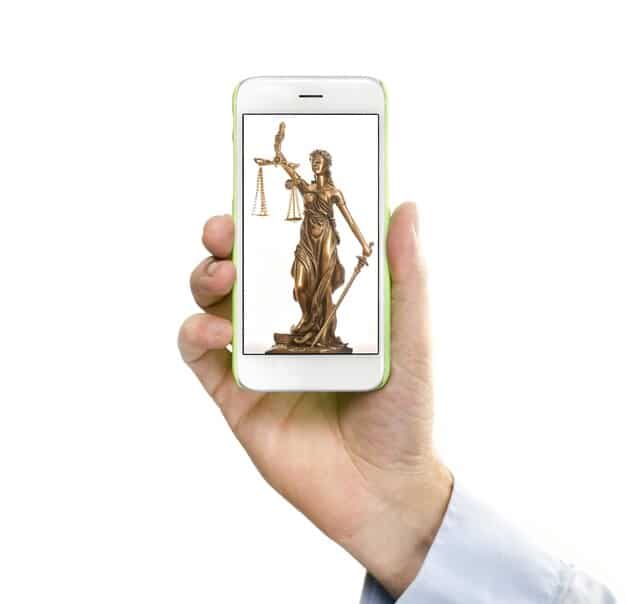The Ethics of Doxing: When Is Exposing Personal Information Justified?

The ethics of doxing, exposing someone’s personal information online, is a complex issue with significant debate around whether it is ever justified, often depending on the context, intent, and potential consequences for all parties involved.
The internet has blurred the lines between public and private, and with that comes the complex issue of doxing. The Ethics of Doxing: Is Exposing Someone’s Personal Information Ever Justified? is a question that sparks intense debate, and it is vital to understand the nuances to navigate these digital dilemmas ethically.
Understanding Doxing: What It Is and How It Happens
Doxing, short for “dropping dox,” is the act of revealing someone’s personal information online without their consent. This information, often obtained through various means, can include real name, home address, workplace, phone number, financial details, and other sensitive data.
The Mechanics of Doxing
Doxing often involves a combination of online research, social engineering, and sometimes hacking. Individuals may scour social media, public records, and even data breaches to gather information about their target.
Once the information is compiled, it is then disseminated online, often through social media, forums, or dedicated websites. The intent behind doxing can vary widely, ranging from personal vendettas to political activism.
The Spectrum of Intentions Behind Doxing
Motivations behind doxing range from exposing perceived wrongdoing to harassment and intimidation. Understanding these intentions is crucial to evaluating the ethical implications of each case.
- Vigilante Justice: Doxing is sometimes used to expose individuals believed to have committed crimes or unethical acts, with the intent of bringing them to justice.
- Political Activism: Doxing can be employed to reveal the identities of individuals involved in controversial political activities, aiming to hold them accountable.
- Personal Vendettas: Doxing may stem from personal disputes, where individuals seek to harm or embarrass their targets.
- Harassment and Intimidation: Doxing can be used as a tool for online harassment, threatening individuals and their families with the release of their personal information.
Ultimately, understanding doxing requires grappling with its various forms, motivations, and consequences. This exploration is key to evaluating the **ethics of doxing** and determining when, if ever, it can be considered justified.
Ethical Frameworks: Balancing Privacy and Accountability
Evaluating the ethics of doxing requires navigating a complex landscape of competing values. On one hand, there is the fundamental right to privacy, protecting individuals from unwarranted intrusion into their personal lives.
On the other hand, there is the value of accountability, holding individuals responsible for their actions and ensuring transparency in matters of public interest.
The Principle of Proportionality
One ethical framework that can be applied to doxing is the principle of proportionality. This principle suggests that the harm caused by an action should be proportionate to the good it intends to achieve.
In the context of doxing, this means weighing the potential benefits of exposing someone’s personal information against the potential harm it could cause to the individual and their family. Is the exposure proportionate to the wrong they commited?
The Role of Intent and Context
The ethical permissibility of doxing often hinges on the intent behind it. Exposing someone’s information with the intent to harass, intimidate, or cause harm is generally considered unethical.
Public Interest vs. Private Harm
Doxing cases often involve a clash between public interest and private harm. Determining whether the public benefit outweighs the potential harm to the individual is a complex ethical judgment.
- Public Safety: If doxing is used to expose individuals who pose a direct threat to public safety, such as terrorists or violent criminals, it may be considered ethically justifiable.
- Transparency: Doxing can be used to reveal corruption or unethical behavior by public officials, promoting transparency and accountability.
- Privacy Invasion: Doxing can result in severe consequences for the individual and their family, including harassment, stalking, and even physical harm.
Ultimately, the morality of doxing is highly contextual, demanding a careful consideration of all relevant factors. How can we ensure that the pursuit of justice does not result in unacceptable harm?
Legal Implications of Doxing: Understanding the Boundaries
Beyond the ethical considerations, doxing also carries significant legal implications. Laws regarding privacy, harassment, and incitement to violence can all come into play when someone’s personal information is exposed online.
Depending on the specific circumstances, doxing can lead to civil lawsuits or criminal charges, underscoring the importance of understanding the legal boundaries.
Defamation vs. Truthful Disclosure
One legal aspect of doxing centers around the distinction between defamation and truthful disclosure. If the information revealed is false and harms the person’s reputation, it could constitute defamation, leading to legal repercussions.
However, even truthful information can be problematic if it is obtained unlawfully or used for malicious purposes.
Harassment and Stalking Laws
Doxing often intersects with harassment and stalking laws. If the intent behind exposing someone’s information is to harass, intimidate, or threaten them, it could violate these laws.
Many jurisdictions have specific laws that address online harassment and cyberstalking, making it a criminal offense to use electronic communication to cause someone emotional distress or fear.
Data Protection and Privacy Regulations
Data protection and privacy regulations, such as GDPR in Europe or CCPA in California, may also be relevant in doxing cases. These regulations establish rules for the collection, use, and disclosure of personal information.
The Role of Internet Service Providers (ISPs)
ISPs (Internet Service Providers) and social media platforms also have a role to play in addressing doxing. They can be compelled by law enforcement to disclose the identity of individuals engaged in doxing activities.
- Terms of Service: Most platforms have terms of service that prohibit hate speech, harassment, and the unauthorized disclosure of personal information.
- User Reporting Mechanisms: Platforms typically provide mechanisms for users to report violations of these terms, including instances of doxing.
- Content Removal: Platforms can remove content that violates their terms of service, helping to mitigate the spread of doxed information.
Navigating the legal landscape of doxing requires a clear understanding of the specific laws and regulations in each jurisdiction. The legal boundaries are often complex and depend on the specific facts and circumstances of each case.

The Impact of Doxing on Victims: Real-Life Consequences
The impact of doxing on victims can be devastating, leading to a range of emotional, psychological, and even physical consequences. Understanding these real-life consequences is essential to evaluating the ethical implications of doxing.
From online harassment and stalking to reputational damage and physical threats, victims of doxing often face a barrage of challenges.
Emotional and Psychological Distress
Doxing can cause significant emotional and psychological distress for victims. The feeling of being exposed and vulnerable can lead to anxiety, fear, and depression.
Reputational Damage and Social Stigma
Doxing can severely damage a person’s reputation and lead to social stigma. The revelation of personal information can affect their relationships, career prospects, and social standing.
Financial and Professional Repercussions
Doxing can have financial and professional repercussions for victims. They may lose their jobs, face difficulty finding new employment, or experience financial losses due to identity theft or fraud.
Physical Safety and Security
In some cases, doxing can threaten the physical safety and security of victims. The release of home addresses and other personal information can lead to stalking, harassment, and even physical violence.
- Increased Risk of Harassment: Victims may experience a surge in online harassment, including abusive messages, threats, and hate speech.
- Stalking and Intimidation: Doxing can lead to real-world stalking and intimidation, as individuals use the released information to track and confront their targets.
- Need for Protective Measures: Victims may need to take protective measures, such as changing their phone numbers, moving to a new address, or hiring security services.
The real-life consequences of doxing underscore the importance of carefully considering the potential impact on victims before engaging in this practice. The emotional, psychological, and physical toll can be long-lasting and devastating.
Doxing and Social Justice: A Double-Edged Sword
Doxing is sometimes framed as a tool for social justice, used to expose wrongdoing and hold individuals accountable for their actions. While it can serve as a means of amplifying marginalized voices and uncovering injustice, it can also be misused and weaponized.
It’s essential to recognize that doxing is a double-edged sword, with the potential for both positive and negative consequences.
Doxing as a Means of Amplifying Marginalized Voices
Doxing can provide a platform for marginalized voices to speak out against powerful actors and institutions. It can help to publicize injustices that might otherwise go unnoticed.
Risks of Misinformation and False Accusations
Doxing is not without risks. Misinformation and false accusations can spread rapidly online, leading to the unjust targeting of innocent individuals.
The Question of Due Process and Fairness
Critics of doxing argue that it circumvents due process and can lead to unfair outcomes. People may be judged and condemned without a fair hearing or opportunity to defend themselves.
Alternative Approaches to Accountability
While doxing may seem like a quick and effective way to hold individuals accountable, it can also undermine trust and create a climate of fear.
- Legal Channels: Doxing often bypasses legal channels for accountability.
- Community-Based Strategies: Education, dialogue, and restorative justice initiatives offer alternative pathways to address wrongdoing.
- Media Advocacy: Strategic media engagement and public awareness campaigns can highlight injustice and promote systemic change.
When considering the potential use of doxing for social justice purposes, it’s crucial to weigh the benefits against the risks. Are there alternative approaches that could achieve the same goals with less potential for harm?
Navigating the Gray Areas: Practical Guidelines and Considerations
Given the complex ethical and legal issues surrounding doxing, it’s essential to develop practical guidelines for navigating the gray areas. When is it ever justifiable to expose someone’s personal information online?
While there is no easy answer, there are several factors to consider that can help guide ethical decision-making.
Consider the Immediacy and Severity of the Threat
If an individual poses an immediate and severe threat to public safety, disclosing their personal information may be justifiable. However, this should be done with extreme caution and in consultation with legal authorities.
Document Everything
Documentation is key: Preserve evidence of any alleged wrongdoing before disclosing personal information. If the information is accurate and supports a legitimate public interest, it increases the ethical warrant.
Minimize Exposure and Harm
If you believe that disclosing personal information is necessary, try to minimize the exposure and potential harm. Only reveal the information that is absolutely essential to achieving the intended purpose.
Seek Legal Counsel
If you are unsure about the legal implications of doxing, seek legal counsel. An attorney can advise you on the relevant laws and regulations in your jurisdiction.
- Transparency: Avoid operating in secrecy or under false pretenses.
- Responsibility: Take reasonable steps to verify the accuracy of the information before disclosing it.
- Safeguards: Be prepared to take steps to protect yourself and others from potential retaliation or harm.
Navigating the gray areas of doxing requires careful consideration, ethical reflection, and a commitment to minimizing harm. It’s always better to err on the side of caution and prioritize the safety and well-being of all involved.
| Key Point | Brief Description |
|---|---|
| 🤔 Doxing Definition | Revealing personal info online without consent. |
| ⚖️ Ethical Balance | Privacy vs. accountability considerations. |
| 🛡️ Victim Impact | Emotional, reputational, and physical safety risks. |
| 🧑⚖️ Legal Repercussions | Defamation, harassment, and privacy laws involved. |
Frequently Asked Questions
▼
Doxing involves the deliberate exposure of an individual’s private or identifying information (like address, phone number, or workplace) online, often without their consent, potentially leading to harassment or harm.
▼
Not always. The legality depends on the intent, context, and specific information revealed. If the intent is malicious or violates privacy laws, it can lead to legal consequences such as civil or criminal charges.
▼
Document everything, report the incident to the relevant online platforms, and consider contacting law enforcement. You may also want to take steps to protect your personal information, such as changing passwords and monitoring your credit report.
▼
This is heavily debated. Some argue it’s ethical when exposing serious wrongdoing that poses a public safety threat. However, the potential harm to the doxed individual must be carefully weighed against the potential benefits.
▼
Limit the amount of personal information you share online, use strong and unique passwords, and be cautious about clicking on suspicious links. Regularly review and update your privacy settings on social media accounts.
Conclusion
The ethics of doxing present a multifaceted challenge, demanding careful consideration of privacy rights, accountability, and the potential for both harm and social justice. Navigating this complex terrain requires a commitment to ethical decision-making, legal compliance, and a deep understanding of the real-life consequences for all parties involved.






